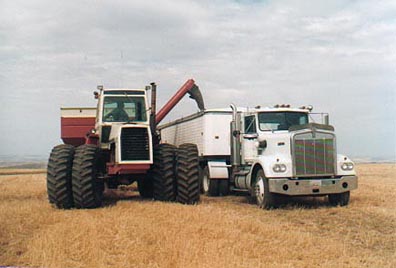Unfortunately it may take catastrophic change before people ask themselves the most important question of the 21st Century: "“How are we going to eat" Michael Kane, a writer From The Wilderness
Does this look to you, like something
that will continue into the coming decades?

World Grain Stocks Fall to 57 Days of Consumption:
Grain Prices Starting to Rise
by Lester R. Brown - Earth Policy Institute
June 15, 2006
Grain Prices Starting to Rise
by Lester R. Brown - Earth Policy Institute
June 15, 2006
This year's world grain harvest is projected to fall short of consumption by 61 million tons, marking the sixth time in the last seven years that production has failed to satisfy demand. As a result of these shortfalls, world carryover stocks at the end of this crop year are projected to drop to 57 days of consumption, the shortest buffer since the 56-day-low in 1972 that triggered a doubling of grain prices.
Further comment on this issue is very telling, and comes from Energy Bulletin, one of my favourite energy sites:
World grain consumption has risen in each of the last 45 years except for three—1974, 1988, and 1995—when tight supplies and sharp price hikes lowered consumption (See Figure). Growth in world grain demand, traditionally driven by population growth and rising incomes, is also now being driven by the fast growing demand for grain-based fuel ethanol for cars.
Roughly 60 percent of the world grain harvest is consumed as food, 36 percent as feed, and 3 percent as fuel. While the use of grain for food and feed grows by roughly 1 percent per year, that used for fuel is growing by over 20 percent per year.
Grain is one of the basic calorie crops which make up a large part of the Western diet. We have become used to shelves stocked with long distance foods. While we can relatively easily grow a few veges, learning to grow our food, in particular the larger volume of calorie crops will be the challenge in a low energy future. We will need to devote larger areas of land to organic production - this will mean more effort and labour especially in the early phase as we regenerate the soil which has been made effectively dead through the use of fossil-fuel chemicals, pesticides and fertilisers.

No comments:
Post a Comment